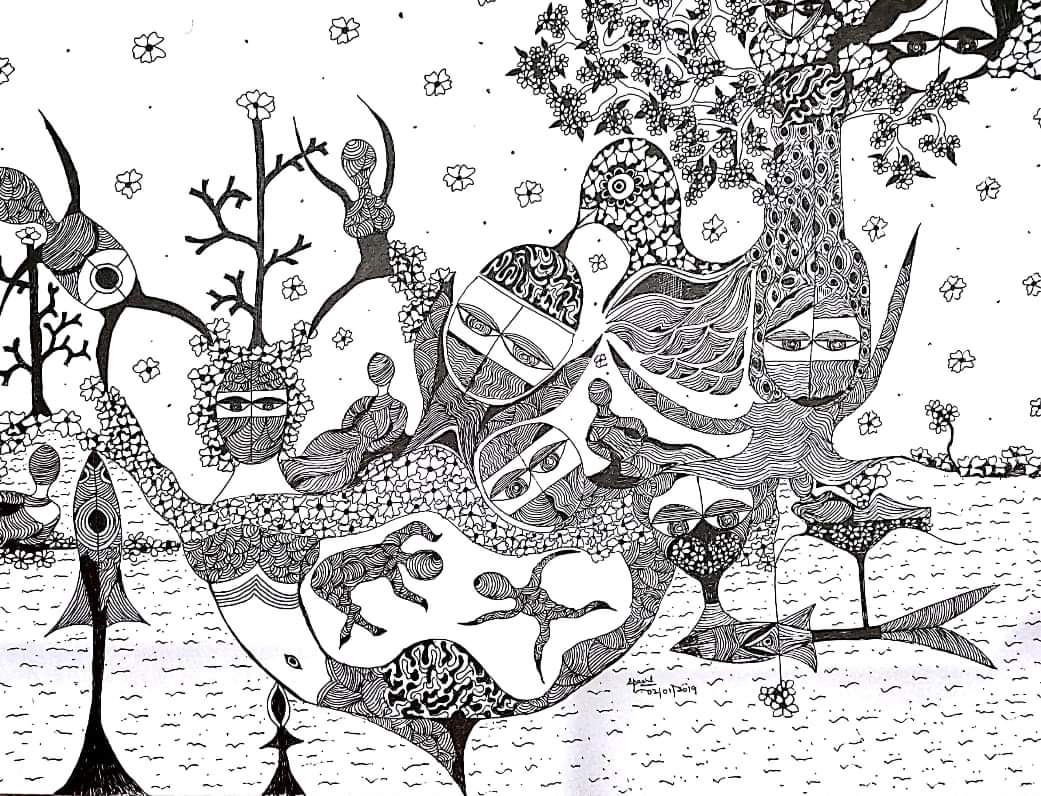
Our Master’s

Sringarapadyavali
Sringarapadyavali presents a Sanskrit verse translation of two hundred selected Tamil poems about Iove. It also presents English verse translation of the same verses and a brief account of the many conventions governing Tamil love poetry. Some of them relate the sentiment to the physical background; for example, secret love develops in the hill slopes while separation is presented in the background of grassy meadows. Throughout the work, love is treated as a divine force.

*
o bee, resplendent with shiny wings
Who spend your life in appraising
The bouquet of flowers : Tell me now,
Not just what takes your fancy but
The absolute truth. Is there a flower
As sweet-scented as the hair of this girl.
The girl with a peahen’s velvet softness
And teeth set close in dazzling rows
Whose love for me will never know
Any surcease through long aeons?
##
The girl to the friend:
I’m anguished. My eyes shed tears
Which bum as they stream down my sunken cheeks And
my lord whom the gods have named
To dry my tears is not present
To perform the task; he left on his travels
Condemning me to anguished tears.
***
The girl to herself :
Dark is the middle of the night
All talk suspended, people
Have settled down to slumber
With passions calmed, the world
And all that lives now sleep Only poor I
Cannot sleep a wink.
(Kuruntokai 6)
***
Passers-by who see a young couple eloping :
Who may these be that have chosen to traverse
The barren desert where the dried-up seeds
Of the vahai tree make a sound in their pods
When the wind shakes them-a sound like the drum
Played by the Aryan dancers gyrating
On the rope that’s tied between two bamboo poles
Stuck on the ground – who may these be,
One of whom wears a hero’s anklet
And the other, a pair of ornaments
On her legs making the softest jingle-
Who may these noble people be
That merit our sympathies and all good wishes?
(Kuruntokai 7)
*****
The girl to the friend:
The lord of my heart has chosen to go
Traversing the barren deserts
Where waterholes are tiny, looking like
Ant hills – with pathways forking out,
Where brigands standing on rocks heated
To the level of stones in furnaces
Sharpen their arrows with which they slaughter
Hapless wayfarers. But the people of this village Far from feeling pity for him
Have chosen to spread calumny,
To heap abuses on him and on me!
(Kuruntokai 12)
***
The friend to the girl:
You think, dear, the lord of your heart,
May go forgetting you in his quest
For a hoard of wealth. It isn’t likely!
For the desert lizard can be heard
Sending his call to his loving mate
By making a sound that is rather like
That produced by the brigands of the desert
Sharpening their arrows on the nails of their fingers.
The call of the lizard to his mate
Will send him speeding home to you !
(Kuruntokai 16)
****
The boy to himself:
Lament, 0 heart, grown lustreless
Like the heads of bards who strum the lute,
Heads bereft of golden bloom
On the death of Evvy, patron of arts? (please check this word)
What is that girl to you in truth?
The girl who wears coiffured braids
Smelling sweet with the brightest blossom
Of the mullai creeper that blooms at night
Twining round the tree that grows
On a side of the house. How does the girl.
Matter to you, 0 heart of mine?
(Kuruntokai 19)
Translated by A. V. Subramanian (b 27 November 1924) joined Indian Railways in 1948 as a Probationary Officer. Served in many parts of India and retired as Additional General Manager, Southern Railway in 1982. Delivered lectures on literature, religion and philosophy in many places in India. Went on lecture tours to USA, Canada, Malaysia, Singapore, Italy, France, and UK. Has written over 80 books on a variety of subjects. Over 30 of them are on aesthetics and literary criticism. He has developed an original theory of aesthetics based on Neurology and has presented many innovative concepts on aesthetics in his books. Won several prizes and citations and honoured by the Tamil Nadu State Government and by reputed literary organizations devoted to the development of Sanskrit and Tamil.

